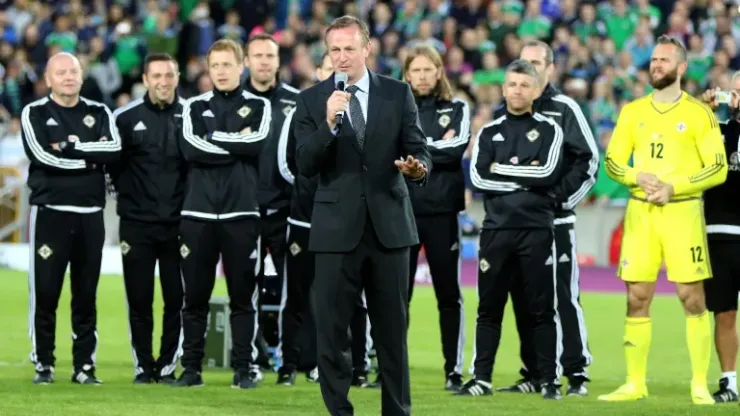Belfast (AFP) – When Michael O’Neill’s first two games as Northern Ireland manager saw them concede nine goals and score none, it was easy to think it was business as usual for one of world football’s smallest nations.
With a population of under two million and no major club team, Northern Ireland remains best known as the birthplace of George Best, Manchester United’s playboy star of the 1960s and 1970s.
And when former Northern Ireland international O’Neill’s men suffered 3-0 and 6-0 defeats by Norway and the Netherlands in successive games in 2012, it looked like another chapter in a familiar story.
Yet now he leads his country into Euro 2016, their first major finals since the 1986 World Cup.
O’Neill must select from a pool of fewer than 40 professional players, of which just a handful play in England’s Premier League, including Chris Brunt and Jonny Evans, who went four and two years respectively without playing in a winning Northern Ireland side.
Brunt, of West Bromwich Albion, misses the finals due to injury.
“There are no Premier League players sticking their hands up to play for Northern Ireland,” O’Neill told the Daily Mail.
Despite the hardship, the 46-year-old O’Neill, whose club career notably encompassed spells with Newcastle United and Coventry City in England and Dundee United and Hibernian in Scotland, has succeeded where higher-profile Northern Ireland managers such as Lawrie McMenemy and Lawrie Sanchez failed.
Having managed Scottish lower league side Brechin City, O’Neill impressed by taking Shamrock Rovers into Europe for the first time when the Dublin side qualified for the Europa League.
“You could have 10 years of management in England and no European experience, whereas I had eight European ties under my belt; FC Copenhagen, Juventus, Rubin Kazan, Tottenham,” he told the Guardian.
“I guess preparation ideas started in me then: ‘How can we compete at this level? How can we not be shown up?'”
It was that thoughtful approach that would see Northern Ireland became the first fifth-seeded nation to top a European Championship group, finishing ahead of Romania and Hungary to reach Euro 2016.
And all that after a failed 2014 World Cup qualifying campaign that included a loss to minnows Luxembourg.
But the attention to detail the manager learnt while working as a financial analyst in Edinburgh, at the end of his playing career, has served Northern Ireland well.
“It all goes back to the World Cup group,” he told the Mail. “I showed them the scores at 80 minutes of our games and we were in every single game at that point. That told us something.”
Roll on to September 2014 and Northern Ireland were losing their first Euro qualifier away to Hungary by a goal.
Except this time they scored twice in the last eight minutes, with striker Kyle Lafferty — whose international career has taken off under O’Neill after the manager made him confront a poor disciplinary record — scoring the winner.
“Suddenly, it’s different,” recalled O’Neill.
“Psychologically it’s huge. That hadn’t happened to these players for a long time.”
200+ Channels With Sports & News
- Starting price: $33/mo. for fubo Latino Package
- Watch Premier League, Women’s World Cup, Euro 2024 & Gold Cup
The New Home of MLS
- Price: $14.99/mo. for MLS Season Pass
- Watch every MLS game including playoffs & Leagues Cup
Many Sports & ESPN Originals
- Price: $10.99/mo. (or get ESPN+, Hulu & Disney+ for $14.99/mo.)
- Features Bundesliga, LaLiga, Championship, & FA Cup
2,000+ soccer games per year
- Price: $5.99/mo
- Features Champions League, Serie A, Europa League & Brasileirāo
175 Premier League Games & PL TV
- Starting price: $5.99/mo. for Peacock Premium
- Watch 175 exclusive EPL games per season






